- Home
- J. G. Ballard
Concrete Island Page 9
Concrete Island Read online
Page 9
* * *
Tired and cold, Maitland lay back against the damp pillow. The young woman moved around the dimly lit room. She straightened her suitcase, and re-hung her clothes. The afternoon light was fading, and Maitland regretted that he had burned the blanket. He realized that he had gained a small advantage over the girl and Proctor. Already he was playing these two outcasts against each other, feeding their mutual distrust.
Yet for the time being he was the young woman’s prisoner, and a prey to whatever devious whims might flick through her mind. In an odd way she seemed to enjoy their relationship. Her attitude towards him varied from tenderness and good humour to a sudden vengeful anger, almost as if he represented two different people for her. After hanging her clothes she lit the stove and made Maitland a drink of condensed milk and hot water. She held his head in her arm, crooning reassuringly as he drank from the plastic cup, half-working her plump breast against his forehead as if feeding her own baby. A minute later, in an abrupt change of mood, she pulled herself away sharply, jarring Maitland’s head. She began to prowl irritably around the room, and turned up the paraffin lamp in a complaining way as if blaming Maitland for the falling afternoon light.
‘Jane…’ Maitland pulled out his oil-stained wallet. ‘Do you want this money? You could use it to get away from here.’ He held out the wallet, feeling a sudden surge of concern for the girl.
‘I don’t want to get away from here. Why should I?’ She turned her head with a flourish, watching him suspiciously.
‘Jane, be serious. You can’t stay in this place for ever – where’s your family? You were married, weren’t you?’ Maitland pointed to the suitcase, adding frankly, ‘I looked through your photographs. Your husband – what happened?’
‘Mind – your – own – damn – business.’ She spoke in firm, quiet tones. Her fingers stiffened like rods. ‘God Almighty, I came here to get away from all these moral attitudes.’ She blundered around the room, as if searching for an exit from Maitland’s nagging. ‘People are never happier than when they’re inventing new vices.’
‘Jane, say I promised you five hundred pounds – would you help me to leave?’
She glanced at him cannily. ‘Why so much? That’s a lot of money.’
‘Because I want us both to get away from here. I think we need each other’s help. I’ll give you five hundred pounds – I’m serious.’
‘Five hundred pounds…’ She appeared to consider his offer, mentally counting each one of a stack of bills. Abruptly she turned on him, gesturing with her pot-smoker’s brown paper bag. ‘Have you any idea how long that would rent a house for a homeless family?’
‘Jane – you’re part of a homeless family. Your child –’
Maitland gave up. He lay back wearily as Jane spread out her kit. For a minute she sat slackly on the edge of the bed, ignoring Maitland’s hand which he placed reassuringly on her arm. Her eyes stared at the shabby wall. Mechanically, she prepared two cigarettes, and wrapped away the kit in its paper bag. Rattling the matchbox as if to revive herself, she lit the first of the cigarettes. She inhaled deeply on the sweet smoke, holding it in her lungs for several seconds. Satisfied, she lay down next to Maitland, nudging him to move over. She pulled her combat jacket over them, smiling wanly to herself as she gazed at the Astaire and Rogers poster.
Maitland felt his mind swaying under the effects of the smoke. The young woman’s strong body pressed against his own as the bed sank in its centre. Her arm rose and fell. She lifted the cigarette to her lips, and offered him a draw. Trying to keep himself alert, and frightened of falling asleep, Maitland fixed his eyes on the fading light coming down the stair well. His fever was returning with the cold evening air.
The young woman smiled at him, taking his hand lightly. Her strong-jawed face lay like a child’s in its bower of red hair. She released the smoke from her mouth and steered it towards him with her hand.
‘Nice…? You know, you could have got away from here, if you’d wanted to.’
‘How?’
‘Right at the beginning…’ She inhaled on the cigarette. ‘If you’d really tried, you could have done.’
‘Tried?’ With a grimace Maitland recalled his ordeal in the rain. He rubbed his chest, covered by no more than the grimy dress-shirt. ‘It’s cold in here.’
The young woman stretched her arm across him. ‘You could have got away,’ she repeated. ‘Proctor doesn’t realize this, but you made it easy for him. Do you know that we both thought you might have been here before?’
She gazed through the smoke at Maitland, and stroked the oil-smeared ruff of his shirt. He watched her without speaking. Her tone was in no way jeering or hostile, but at the same time she seemed to be testing both him and herself, exploring through Maitland some failure in her own past. With an unerring eye for the defects of others, she had seen that he would accept this role.
Had he, in fact, deliberately marooned himself on the island? He remembered his refusal to walk through the overpass tunnel to the emergency telephone, his childish insistence that a rush-hour driver stop for him, the anger that had poured out … he had sat in that empty bath as a child, screaming with the same resentment.
Deciding to play the girl’s game, he said, ‘Jane, you owe it to yourself to leave here – by staying on the island you’re just punishing yourself.’
‘Big deal – I don’t get that.’ Her eyes glinted in her cold, euphoric face. ‘Anyway, it’s easier than coming to terms with something. I was never very good at patching up quarrels – I wanted to go on simmering for days. That way you can really hate…’
She smoked the last of the cigarette. When she had finished it she placed her hand on Maitland’s stomach. Moving her head, she kissed him on the mouth.
‘Don’t tell me I touched a nerve?’ she asked.
‘Perhaps you did.’ Maitland tried to put his arm around her waist, but his fever was rolling in waves across his body. ‘These last four days have been strange – like visiting an insane asylum and seeing yourself sitting on a bench.’
He slipped away from her. Vaguely he was aware of her undressing. As she smoked the second cigarette she examined her stomach and breasts in the travelling mirror. She changed into a short, blood-red skirt and sleeveless lurex blouse. He had already fallen asleep when she turned down the lamp and left the room, her stiletto heels clattering on the stairs.
* * *
Hours later, in the centre of the night, he heard her return. The traffic sounds had gone, and as she argued with Proctor her sharp voice carried clearly over the seething grass. The tramp seemed to be remonstrating with her, whining that she had forgotten to bring something for him. When she came into the room she turned up the lamp and glared down drunkenly at Maitland. Her wild hair flamed around her in the vivid light like a demented sun.
She clattered among the cans and saucepans, barely able to focus her eyes. Maitland watched her uneasily. Her behaviour warned him that she might be mentally disturbed, perhaps a fugitive from a Broadmoor institution. Was it Jane, and not her mother, who had been the inmate of the sanatorium in the photograph? Too weak to protect himself, he listened to the cosmetics tumbling from the card-table. A poster ripped in her hands as she swayed around the room, tearing Manson’s face. When she brought a cup over to him and held his head he drank gratefully in his fever.
Gasping for breath, he choked on the dilute paraffin she had fed him. He vomited into her hands and lay retching across the bed. He tried to hold off the girl as she tottered towards him with a glass of milk, laughing into his face.
Behind her, Proctor burst into the room. The polished lapels of his dinner-jacket gleamed like mirrors in the blazing light. Pushing Jane aside, he bent over Maitland and wiped the paraffin from his face. She screamed at him, flinging the vomit-smeared combat jacket after them as Proctor carried Maitland up the staircase and laid him on the wet midnight grass.
15 The bribe
THE morning traffic, opening the new
week, moved along the eastbound lanes of the motorway. Robert Maitland sat against the curved roof of the air-raid shelter in which Proctor had made his home, watching the sharp sunlight cut across the polished cellulose of the vehicles driving into central London. It was shortly after eight o’clock, and the cool air refreshed him after the night of fever. His injured leg lay in front of him. The hip joint was still stiff, needing some kind of surgical intervention, but the deep abrasions on the thigh had begun to heal.
In spite of his inability to walk, Maitland felt calm and determined. The last traces of his fever had receded. His stomach was filled with the crude meal Proctor had prepared for him – sweet tea and a surprisingly appetising gruel of cold fried potatoes, pieces of fatty meat and coleslaw which Maitland had devoured. The taste of paraffin still filled his mouth and lungs, but he inhaled the fresh scents of the grass forest that grew around his legs.
He watched Proctor cleaning out the shelter. This deep burrow, where Maitland had spent the night, was little more than a large kennel, its walls lined with patched quilts. After being carried there on the tramp’s powerful back, Maitland had lain half-conscious on a mattress by the doorway, while Proctor moved about his den like a hard-working and insecure animal. Everything in the shelter was locked away in a series of wooden boxes below the quilts and mattresses. During the night, whenever Maitland began to retch emptily, trying to vomit away the paraffin that filled his lungs, Proctor agitated himself in a nervous hunt. He lifted up corners of the quilts and replaced them as he searched for a forgotten cubbyhole. Eventually he produced a shallow pail and a roll of cotton waste. For an hour he sat beside Maitland, wiping his eyes and mouth. In the light reflected from the evening motorway his broad face with its universe of creases hovered above Maitland like an anxious beast’s. All night he moved restlessly around his burrow, keeping up a continuous pointless activity. The quilted floor merged into the walls, as if the lair had been designed to blunt and muffle all evidence of the world outside.
Maitland watched the traffic move past along the motorway. The embankments seemed further away than he remembered them, slowly receding from him on all sides. By contrast the island appeared far larger, covered by a dense and luxuriant growth. Maitland shivered in the cool morning air. Through the doorway of the shelter he could see his dinner-jacket hanging beside the threadbare leotard.
Proctor’s head emerged from the den. He scrutinized Maitland for several seconds before the rest of his body came into view.
Maitland clasped his shoulders. ‘Proctor – I’m cold. Have you got a coat? I won’t ask you for my dinner-jacket.’
‘Aah … no coat.’ Proctor said regretfully. He began to rub Maitland’s arms in his strong hands. Patiently, Maitland pushed him away.
‘Look – I need something to wear. You don’t want me to catch fever again –?’
‘No more fever…’ Proctor glanced at Maitland’s watch on his wrist as if its luminous dial might solve this problem. He pulled out the winder and rotated the hands at random. Satisfied, he showed the watch to Maitland. The new time-setting seemed to make him more comfortable. ‘No more fever for Mr Maitland,’ he announced, but a moment later he bounded down into the shelter and rooted under his quilts. He returned with an old woollen shawl.
Maitland draped the yellowing garment around his heavy shoulders, ignoring the sweet, musty smell. Proctor hovered from one foot to the next, almost as if he were awaiting instructions. Despite his sudden moods of violence, the tramp was a placid and warm-hearted man, with the natural dignity of a large, simple animal.
Proctor kicked away the loose stones lying in the grass outside the shelter and began to practise his gymnastics, clearly with the intention of impressing Maitland. After a clumsy forward somersault he attempted a crude cartwheel, and landed on his head in a heap. Sitting there, he examined his hands and feet, as if mystified why they should fail him.
‘Proctor –’ Maitland chose his words carefully. ‘I’m going to leave here today. I must go home – do you understand? You’ve got your home here, and I’ve got mine. I have a wife and a son – they need me. Now, I’m grateful to you for looking after me…’
He stopped, realizing that the last sentence was the only one which had registered on the tramp’s mind.
‘Listen to me, Proctor – I want you to help me climb the embankment. Now!’
He held out his arm to Proctor, but the tramp glanced uneasily towards the ruined cinema. ‘Help Mr Maitland … how? Maitland’s sick.’
Doggedly, Maitland controlled his anger. ‘Proctor, you’re strong enough to carry me. Help me and I won’t tell the police you’re here. If you keep me here any longer they’ll take you away – put you into an institution. You don’t want to spend the rest of your life in prison?’
‘No!’ Proctor shouted the word vehemently. He looked around carefully, as if nervous that a passing driver might have heard him. ‘No prison for Proctor.’
‘No,’ Maitland agreed. Even this brief conversation was exhausting him. ‘I don’t want to send you to prison. After all, you’ve helped me, Proctor.’
‘Yes…’ Proctor nodded vigorously. ‘Proctor helped Mr Maitland.’
‘Right, then.’ Maitland hoisted himself on to the crutch and swayed unsteadily as the blood left his head. He tried to hold Proctor’s shoulder, but the tramp stepped back. Maitland pointed himself in the direction of the motorway embankment. The westbound lane was almost deserted, but on the far side of the central reservation the three lanes of traffic pressed towards central London.
‘Proctor! Over here – give me a hand!’
The tramp stood his ground, slowly shaking his huge creased head. ‘No…’ he said finally, staring at Maitland’s gaunt and ragged figure as if no longer recognizing it. ‘Miss Jane…’
Before Maitland could protest he had turned and scuttled into the long grass, head bent below the waving blades.
* * *
Reviving himself on the cold air, Maitland wrapped the shawl tightly around his chest and set off alone towards the embankment. Proctor’s refusal to help him, and the tramp’s evident fear of the young woman, did not surprise him. They were part of that conspiracy of the grotesque which had kept him marooned on the island, for what was now his fifth day. He thrashed at the grass in front of him, identifying its luxuriant growth with all the pain he had felt.
Even this short journey across the island exhausted him. After the meagre breakfast of scraps he was already ravenous again. Each day that passed had fractionally cut away his strength. The deep grass jostled around him on all sides like a hostile crowd. Swaying unsteadily, Maitland pressed on across the central valley. By the time he reached the breaker’s yard with its semi-circle of rusty vehicles he was almost too tired to identify the crashed Jaguar.
The sky had clouded over, and a cold drizzle fell through the retreating sunlight. Maitland climbed into the rear seat of the car, his home for his first days on the island. As he tried to massage a little warmth into his stick-like arms he thought hard about Proctor and Jane Sheppard. Somehow he must devise a means of dominating them. At any moment they might simply lose interest in him altogether, leaving him to perish inside the hull of this burnt-out car. Maitland looked up at the embankment – not only had the slope become steeper than he remembered it, but the hard shoulder and balustrade seemed twenty feet higher.
First, he needed a bribe. Climbing from the car, he took out his keys. He opened the trunk. Inside the carton were the last three bottles of white Burgundy. He secured one of the bottles inside the shawl, locked the trunk and set off for Proctor’s den.
The doorway to the shelter was padlocked. Catching his breath after the effect of re-crossing the island, Maitland leaned on the crutch in the thin rain. The tramp was squatting by the gutter of the feeder road embankment, patiently filling a tin bucket with water dripping from the face of the route indicator seventy feet above him.
He returned to the shelter when he saw Maitland, movin
g like a large mole through the grass. Two mess-tins rattled from his waist-belt. In his right hand he held a clutch of some half-dozen spring traps. A pair of small rats hung from the trap-jaws, their long tails swinging together. Looking at him, Maitland remembered the injured rat who had climbed across his leg. Presumably Proctor supplemented his meagre diet with these field rodents. Yet somewhere he had access to other food-sources. Once he could discover these, Maitland’s tenancy of the island would be more secure.
‘Proctor – I need food. I’ll pass out soon if I don’t get something to eat.’
The tramp stared at him warily. He raised the rattraps, but Maitland shook his head.
‘No food,’ Proctor said flatly.
‘That’s rubbish – we had breakfast. Meat, potatoes, salad – where did you get it?’
Proctor’s eyes were drifting away, as if he were about to lose interest in the discussion. Maitland pulled the bottle of wine from his shawl. ‘Wine, Proctor – wine for food. Let’s exchange.’
He held out the bottle to the tramp, who raised the cork to his nose, sniffing at the metal foil.
‘All right – Proctor take you to the food place.’
16 The food source
THEY set off along the central valley towards the overpass. Maitland swung himself clumsily on the metal crutch, wishing that he could disconnect his right leg and throw it away. Proctor scurried ahead, his body bent horizontally at the waist, always below the level of the grass canopy. He deliberately sought out the areas of deepest growth, as if he were most at home in the invisible corridors that he had tunnelled in his endless passages around the island.
They approached the wire-mesh fence below the overpass. As they emerged from the grass, like swimmers coming ashore, Proctor gazed uncertainly at the concrete parapets around them. The magnified roar of the traffic unsettled him, and he seemed almost bemused now that he had left the sanctuary of the island and its green swaying ocean. Maitland noticed that the tramp moved his head as if he could barely focus on any distant object and, like a bird, relied on being able to react to brief sharp movements against the background of a static visual field. Watching him, Maitland visualized the half-blind acrobat, irises occluded by gathering cataracts, no longer able to see the surrounding traffic streams and living alone in this forgotten world whose furthest shores were defined only by the roar of automobile engines, the humming of tyres and squeal of brake linings. For Proctor, as Maitland had seen already, the deep grass was his vital medium. His scarred hands felt the flexing stems, reading their currents as they seethed around him. He thought of Proctor emerging from his den in the seconds after the crash, feeling the impact of the Jaguar jarring through the grass in a series of warning ripples …

 High-Rise
High-Rise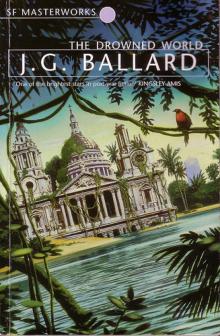 The Drowned World
The Drowned World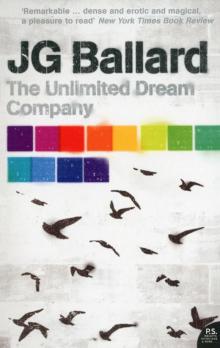 The Unlimited Dream Company
The Unlimited Dream Company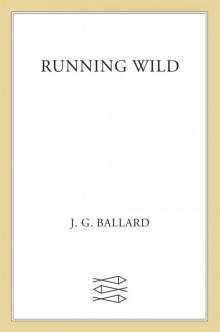 Running Wild
Running Wild The Day of Creation
The Day of Creation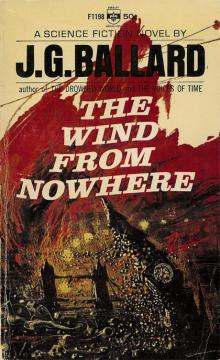 The Wind From Nowhere
The Wind From Nowhere The Complete Short Stories, Volume 2
The Complete Short Stories, Volume 2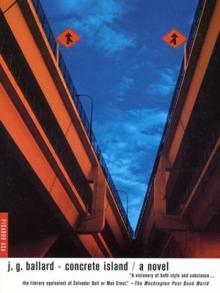 Concrete Island
Concrete Island Empire of the Sun
Empire of the Sun The Kindness of Women
The Kindness of Women Vermilion Sands
Vermilion Sands Super-Cannes
Super-Cannes Millennium People
Millennium People The Complete Stories of J. G. Ballard
The Complete Stories of J. G. Ballard Crash
Crash The Drought
The Drought The Atrocity Exhibition
The Atrocity Exhibition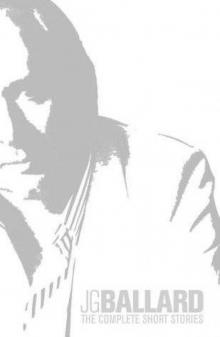 The Complete Short Stories: Volume 1
The Complete Short Stories: Volume 1 Miracles of Life: Shanghai to Shepperton: An Autobiography
Miracles of Life: Shanghai to Shepperton: An Autobiography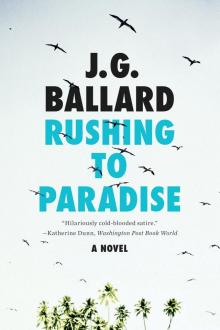 Rushing to Paradise
Rushing to Paradise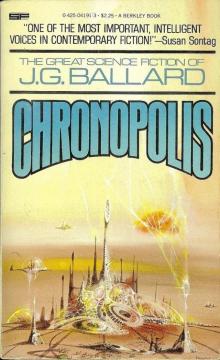 Chronopolis
Chronopolis Cocaine Nights
Cocaine Nights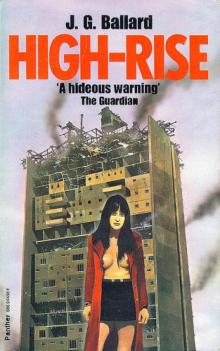 High Rise (1987)
High Rise (1987) The Complete Short Stories
The Complete Short Stories The Day of Creation (Harper Perennial Modern Classics)
The Day of Creation (Harper Perennial Modern Classics) The Crystal World
The Crystal World